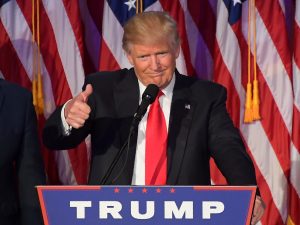
(Photo by JIM WATSON/AFP/Getty Images)
We may never get an indictment from the grand jury convened by Fulton County District Attorney Fani Willis to investigate efforts to interfere with the 2020 presidential election, but we’ve already seen plenty of fireworks out of Atlanta.
In mid-April, Willis moved to disqualify attorney Kimberly Debrow from representing any of the ten fake Trump electors whom she still counts as clients. Debrow, along with attorney Hollie Pierson, originally handled subpoenas for eleven of the MAGA loyalists who met in the basement of the Capitol and swore themselves in as “alternate” Trump electors on December 14, 2020. But last year, Judge Robert McBurney ruled that state Republican party chair David Shafer, was a more central figure in the fake electors scheme than Pierson and Debrow’s other clients.

7 Key Trends In Law Firm Rate Negotiations
And how to navigate them in 2026.
“Given the information before the Court about his role in establishing and convening the slate of alternate electors, his communications with other key players in the District Attorney’s investigation, and his role in other post-election efforts to call into question the validity of the official vote count in Georgia, the Court finds that [David Shafer] is substantively differently situated from the other ten clients jointly represented by Pierson and Debrow,” the court wrote. “His signed waiver may be identical, but his situation is not.”
So as a compromise, Pierson took Shafer, while Debrow continued to represent the other ten electors. But now Willis says that some of those ten are accusing one of their number of criminal conduct. In the meantime, while most of the electors have accepted a grant of immunity, the DA says that multiple of them claim not to have known about a similar offer of immunity extended a year ago. Debrow vehemently denies the allegation, calling it a “complete fiction” and accusing the prosecutor of misconduct.
In support of this, Debrow included an excerpt of the letter to the DA in which she and her then co-counsel Pierson rejected the offer in language verging on the unhinged.
While an offer of immunity from prosecution is enticing at first blush, [the elector nominees] all fundamentally distrust the motives and intentions of the DA and the investigative team in this case, due in part to the abrupt and unexplained change in each of their statuses in the investigation from witness to target, in part to the abrupt decision to potentially offer immunity to some of them after having stated in open court only days before that the DA had no intention of immunizing any of them, and in part to their perception that this investigation into their lawful conduct is not based on (or even interested in) the facts or the law but instead is politically motivated.
Our clients, therefore, have grave concerns that if they were to be offered immunity from prosecution, accepted that offer, and then told your team and/or the grand jury the truth — which is that neither they nor the other electors committed any illegal act or engaged in any sort of conspiracy with regard to the 2020 election – the DA and your team would not accept that truth, especially because you have represented that you have evidence to the contrary. In such a scenario, our clients believe that the DA’s Office is likely to threaten to or actually charge them with perjury or false statements to law enforcement officials or similar after their truthful, immunized testimony merely because the immunized witness is not in a position to tell the DA’s Office or the grand jury the story they want to hear.

Transform Legal Reasoning Into Business-Ready Results With General AI
Protégé™ General AI is fundamentally changing how legal professionals use AI in their everyday practice.
Debrow then went on to insist that she can continue to represent each of the electors, since (a) they are all categorically innocent, and (b) having been immunized, they are now no longer at risk — something rather contradicted by her own histrionics in the above letter.
Meanwhile, Pierson released a March 23 letter to the DA in which she makes what is essentially an advice of counsel defense on Shafer’s behalf, claiming that he was advised by various Kraken and Trumpworld lawyers that the electors needed to meet and sign an electoral certificate claiming to be the Georgia electors as a contingency in case Trump’s then-pending lawsuit against Secretary of State Brad Raffensperger were to succeed. She likens the fake electors to the Kennedy electors who swore themselves in conditionally in Hawaii in 1960, even though Nixon was originally certified the winner of the state.
That line of reasoning may indeed carry the day, but Pierson makes a couple of very strange arguments to buttress it. First, she scoffs at claims that the meeting to swear themselves in was done “in secret,” pointing out that it was covered extensively by the press. In fact, the Trump campaign liaison instructed the electors to meet in “complete secrecy and discretion” and demanded that “at no point should you mention anything to do with Presidential Electors or speak to media.” The meeting was uncovered by Atlanta Journal-Constitution reporter Greg Bluestein, forcing the cosplay electors to let reporters in. But they certainly made every effort to hide what they were doing at the time.
Hmmm … I am at the Capitol where Democratic electors are about to vote. And I spotted a few GOP electors behind this door, as well as some Georgia Republican officials. A guy at the door called it an “education meeting” and scrambled when I tried to walk in. #gapol pic.twitter.com/1daHMBe8zk
— Greg Bluestein (@bluestein) December 14, 2020
Similarly, Pierson’s description of the “pending” electoral challenge which necessitated the electors swearing themselves in contains some, umm, mistakes about the procedural history of the case. She writes:
The Georgia Election Code requires lawsuits contesting elections to be heard within 20 days of being filed. The election contest pending at the time of the meeting of the presidential electors, Trump et al. v Raffensperger, et al., was never heard or adjudicated. In fact, in violation of state law, it was not properly assigned to a judge and scheduled for a hearing until January 8, 2021 – weeks after the 20 day statutory deadline and 2 days after Congress counted the electoral votes from the states and certified the result. The timely filed election contest was thereupon mooted by the inexplicable inaction of the state courts of Georgia, never receiving a single hearing, let alone an evidentiary hearing, which would have afforded the parties an opportunity to present their evidence and make their arguments.
That is simply not what happened, although it has become accepted gospel in MAGAworld. In fact, Trump, along with Shafer, filed his case on December 7 requesting emergency declarative and injunctive relief. The next day, Biden’s electors intervened and moved for oral argument. On the 9th, Trump’s lawyers objected to the intervention and said they had withdrawn the motion for TRO, so there was no live emergency. They don’t seem to have understood that this put them back in the regular queue for judicial assignments, and on December 11 they filed an emergency petition for certiorari complaining about it to the Georgia Supreme Court, which promptly told them to go away because there was nothing to appeal.
So while it’s technically true that the case was “pending,” on December 14, it had no chance of resolution before the election would be certified thanks to the petitioners’ own incompetence and not “the inexplicable inaction of the state courts of Georgia.” Indeed, the petitioners, who included Shafer, submitted a notice of voluntary dismissal citing an “out of court agreement,” only to have Secretary Raffensperger submit a furious response denying that any such settlement existed and accusing the lawyers on that case — some of whom have been subpoenaed as witnesses here — of making “demonstrably false characterizations.”
Presumably, DA Willis is aware of this history and will reference it in her response. And on Monday May 15, she’s due to respond to Trump’s motion to quash the report and all evidence from the Special Purpose Grand Jury on grounds of “that lady is mean” or some such. Be there … will be wild.
Liz Dye lives in Baltimore where she writes about law and politics and appears on the Opening Arguments podcast.